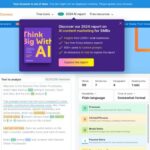Businesses are constantly seeking ways to stay ahead in a competitive landscape.
One powerful solution is adopting artificial intelligence tools, which can revolutionize various aspects of a company’s operations.
The best AI tools for business enhance performance, streamline processes, and aid decision-making, thereby offering a significant competitive edge.

AI is reshaping marketing and sales by providing data-driven insights and automating customer interactions.
It helps in creating tailored content, managing campaigns, and analyzing consumer behavior more efficiently. This allows businesses to target audiences with precision and optimize their strategies.
Innovations in AI-powered tools extend beyond marketing, offering robust applications in data analysis, customer service, and creative processes.
Machine learning and automation make it easier to visualize data trends and engage customers effectively, while AI platforms support collaborative work environments, boosting productivity.
Key Takeaways
- AI tools improve business performance significantly.
- AI enhances marketing strategies through precise targeting.
- Integration of AI in data and customer service boosts efficiency.
Leveraging AI for Enhanced Business Performance

AI tools play a crucial role in enhancing business performance by boosting efficiency and aiding in decision-making.
Two key areas where AI excels are predictive analytics and automation, both of which significantly impact business operations.
Predictive Analytics and Patterns
Predictive analytics harnesses machine learning to analyze data and detect patterns that forecast future events. This capability is crucial for businesses aiming to make informed decisions.
By using tools like Pecan, companies can simplify complex data science tasks and predictive modeling, enabling them to anticipate market trends and customer behaviors effectively.
Optimizing decision-making processes is another benefit. Businesses can adjust strategies based on data-driven insights, greatly enhancing their competitiveness. Personalization is also improved. Predictive analytics allows companies to tailor their offerings to meet individual customer needs more effectively.
Automation for Productivity
Automation tools streamline repetitive tasks, increasing productivity and efficiency.
AI-driven platforms handle tasks like data entry, customer service interactions, and even scheduling. This frees up human resources for more strategic actions that require creativity and critical thinking.
Leveraging automation also optimizes business operations by reducing errors. AI tools like Clari’s RevGPT can answer complex questions quickly, saving valuable time for employees. As a result, resources are allocated more effectively, leading to improved overall performance. Businesses focusing on automation can thus operate smoother, cut costs, and increase productivity.
AI Tools in Marketing and Sales

AI tools are transforming how businesses approach marketing and sales. From creating engaging content to gathering customer insights, these technologies enhance efficiency and effectiveness.
Content Creation and SEO
AI in content creation helps businesses craft engaging social media posts and compelling landing pages.
Tools like Jasper.ai can produce natural-sounding text, ideal for blogs and emails. These tools analyze SEO data to optimize content, improving search engine rankings.
AI can identify trending topics and suggest keywords. Marketers can use these insights to tailor content strategies, meeting audience needs while staying relevant. Email marketing benefits from AI by sending targeted messages based on customer behavior, increasing conversion rates.
Customer Relationship and Insights
AI tools offer deep insights into customer behavior and preferences, helping businesses refine their segmentation strategies.
Platforms like Hippo Video enable personalized video content for sales outreach, fostering stronger customer connections.
By analyzing customer feedback, AI tools help businesses understand pain points and opportunities. This data drives improvements in product offerings and customer service. In addition, AI assists in studying large datasets to predict trends and behaviors, allowing businesses to make informed decisions.
Innovations in AI-Powered Content Generation

The world of content creation is rapidly transforming with advancements in AI technology. Key innovations include improvements in natural language processing and automation of content generation, making tasks like writing blog posts and articles faster and more efficient.
Advancements in NLP for Content
Recent innovations in natural language processing (NLP) are redefining content creation.
Machine learning algorithms now enable tools like Grammarly to suggest context-aware edits and improve readability. These advancements allow AI to grasp nuances in language better, ensuring higher quality output.
Understanding context and tone is crucial for generating content like product descriptions or marketing copy. AI tools can adjust language style based on audience needs, ensuring more personalized content. NLP technologies also help summarize large volumes of text, making it easier for writers to focus on creativity and maintain consistency.
Automating Blog and Article Writing
AI tools are making it easier to automate the writing of blog posts and articles.
Platforms like Writesonic help generate content by providing outlines and even full drafts based on given topics. This tool assists in crafting unique content efficiently, saving valuable time for content creators.
Automated content systems can write product descriptions quickly, ensuring consistent messaging across platforms. AI copywriting tools provide ideas and suggestions that maintain a brand’s voice, enhancing the overall content strategy. These capabilities demonstrate how automation, powered by AI, is revolutionizing traditional content creation processes.
Machine Learning for Data Analysis and Visualization

Machine learning plays a pivotal role in unlocking insights from vast amounts of data. It helps businesses understand market trends, predict customer behavior, and visualize data for actionable insights.
This section explores how machine learning improves data analysis and visualization within a business context.
Understanding Market Trends through Data
Machine learning helps in interpreting complex data sets to recognize market trends and customer behavior.
By analyzing past and current data, algorithms can provide predictions about future sales patterns and potential financial outcomes. This can be highly beneficial in sectors like retail and finance where identifying trends early can lead to competitive advantages.
Fraud detection is another crucial area where machine learning is used to track anomalies. By examining transaction patterns, businesses can quickly detect unusual activities. For instance, financial institutions often rely on these technologies to catch unexpected account behaviors, thereby improving security and customer trust.
Machine learning can reduce errors by automating the detection of trends. This gives businesses a more accurate picture of what could lie ahead. Companies are increasingly adopting these tools to stay ahead by anticipating changes in the market landscape.
Visualization Tools for Business Insights
Data visualization helps in translating large sets of complex information into easy-to-understand visual formats.
Tools like Tableau and Power BI can connect various data sources to create interactive dashboards. This aids companies in quick decision-making by highlighting key performance indicators and patterns.
Incorporating artificial intelligence, these tools enhance visualization. Microsoft Power BI uses AI capabilities to find patterns that may not be immediately obvious through traditional methods.
Visualization tools help bridge the gap between data and decision-makers. They present information in a way that makes complex analytics more accessible, allowing teams to take timely actions based on real-time data insights. This improves the overall strategic capabilities of a business.
Improving Customer Service with AI

Artificial Intelligence (AI) is revolutionizing customer service by enhancing efficiency and creating personalized experiences. Businesses can implement AI to handle routine tasks and provide insights into customer needs, ultimately leading to improved customer satisfaction.
Implementing Chatbots for Efficiency
Chatbots have become an essential tool for customer support.
They provide 24/7 assistance, handling common queries with ease and freeing up human agents for more complex issues. AI-powered chatbots, such as those offered by Tidio, can understand and respond in real time, providing immediate solutions to customer problems.
These chatbots streamline customer interactions by reducing wait times and ensuring consistent responses. They also gather valuable customer insights, allowing businesses to predict future trends and make data-driven decisions. Chatbots not only improve the customer experience by offering quick resolutions but also help in reducing operational costs.
Personalized Customer Interactions
Another advantage of AI in customer service is the ability to create personalized interactions.
By analyzing data, AI tools can segment customers based on behavior, preferences, and purchase history. This allows businesses to tailor their services more effectively, enhancing the overall customer experience.
Personalization leads to better engagement by connecting customers with the agents best suited to meet their needs. Companies can use AI to deliver targeted recommendations and promotions, which can increase customer satisfaction and loyalty. Real-time data analysis helps in modifying strategies swiftly, creating an adaptive and responsive service environment.
AI in Creative and Design Processes

AI is revolutionizing creative fields by enhancing artistic capabilities and simplifying design tasks. Key tools are empowering designers with new possibilities and efficiency.
Boosting Creativity with Generative AI
Generative AI is changing how artists and designers create.
Tools like Midjourney enable users to generate unique images, enhancing creative possibilities. Artists can input text descriptions to create visuals that match their vision.
For graphic design and branding, Looka offers solutions by providing AI-driven branding resources. These resources help businesses design logos and marketing materials without starting from scratch. The technology behind AI image generation, such as Stable Diffusion, supports rapid experimentation and refinement, allowing creators to explore different styles and concepts efficiently.
Streamlining Design Workflows
AI tools are transforming how designers work by making processes faster and more intuitive.
Platforms like Runway simplify complex tasks such as AI video editing and image generation, allowing designers to implement ideas without needing deep technical knowledge.
Canva’s integration of AI offers features like Magic Design and Magic Studio, which enhance functionality with AI-driven photo editing and text-to-video conversion. AI is also used in Synthesia for creating engaging video content easily, while optimizing motion graphics design tasks. These tools save time by automating repetitive tasks and refining projects with precision.
The Integration of AI Tools in Collaborative Work Environments

AI tools have transformed collaborative workspaces by enhancing productivity through better management and communication. Key features include improved project management and streamlined processes for scheduling and email automation.
Collaboration and Project Management
Tools like ClickUp are integral for organizing tasks and managing team collaboration efficiently. Featuring project management, document processing, and internal communication tools, platforms such as ClickUp ensure seamless task assignment and tracking. Microsoft Teams enhances real-time communication and integrates with other tools.
Slack allows teams to set up channels for different projects, ensuring focused discussions. Asana and Todoist simplify prioritization and task tracking, helping teams manage deadlines effectively. These platforms provide templates and dashboards that visually represent project metrics, aiding decision-making.
Combining real-time updates and automation, AI tools support project management by minimizing manual work and error rates. Teams leverage these technologies to align tasks and monitor progress, increasing overall efficiency.
Automating Scheduling and Emails
AI-driven tools are crucial in managing scheduling and email communications. Services like Mem and Microsoft integrate user calendars to auto-schedule meetings based on participant availability.
Automated reminders and follow-up emails ensure all team members stay informed.
AI also aids in drafting emails, suggesting responses, and even translating languages when needed, enhancing smooth communication across diverse teams. Tools like OpenAI incorporate natural language processing to facilitate more efficient email handling, reducing time spent on routine tasks.
Platforms such as Descript help in creating professional presentations that align with meeting schedules, ensuring clarity and impact in communication strategies.
This automation frees up time, allowing teams to focus on strategic tasks rather than administrative chores.
AI Platforms and Software to Watch

ChatGPT by OpenAI continues to be a leading AI language model. It’s praised for creating human-like text and is widely used across industries.
Jasper is another popular AI tool, especially for businesses focused on content creation. It’s known for producing high-quality written material quickly and efficiently.
Google Bard focuses on delivering natural conversations and can be integrated into various applications. It’s a competitor to other conversational AI models.
Zapier automates workflows by connecting different apps and services, making it essential for businesses looking to streamline operations without coding.
Murf is an AI voice generator turning text into voice-overs and is used by content creators needing high-quality audio.
Runway helps with AI-driven video editing and creation. It offers powerful tools for video professionals looking to enhance their projects with AI technology.
AI Platforms
These platforms offer diverse functionalities for various business needs:
- TensorFlow: A robust open-source library for building AI models. It’s favored by developers for its flexibility.
- IBM Watson: Known for robust AI solutions, it’s used for building and training AI models.
- Amazon SageMaker: Helps in creating and deploying machine learning models quickly, providing a solid platform for AI development.
Frequently Asked Questions

This section addresses various AI tools and solutions that cater to different business needs. It covers tools for marketing, useful free options for startups, key features to enhance operations, and methods for data analysis. It also highlights productivity tools and resources beneficial to student entrepreneurs.
What are the leading AI-driven marketing tools available for businesses?
AI-driven marketing tools have become essential for modern businesses. Manatal offers solutions for recruitment, while Frase.io enhances SEO and content creation by producing well-researched content rapidly.
These tools help companies streamline their marketing efforts and improve online visibility, making them indispensable for marketing teams.
Which free AI tools are most beneficial for startups and small businesses?
Many startups benefit from free AI tools that provide significant value without high costs. Tools like Otter AI assist in transcribing meetings, helping teams stay organized and efficient.
These resources are particularly beneficial in the initial phases when budgets are tight.
What are the key features to look for in AI tools aimed at improving business operations?
Businesses seeking AI solutions should focus on tools that offer automation, data analysis, and efficiency improvements. AI tools should be able to automate repetitive tasks, offer insights from customer data, and enhance overall productivity.
Choosing tools with these features can substantially improve business operations and decision-making processes.
How are AI tools transforming data analysis for business decision-making?
AI tools are revolutionizing how businesses analyze data. They help extract valuable insights from large datasets, enabling smarter decision-making.
AI algorithms can recognize patterns in data, allowing companies to make informed and data-driven choices, becoming a vital component in strategic planning and operations.
What AI solutions are recommended for entrepreneurs aiming to enhance productivity?
Entrepreneurs can significantly enhance their productivity with AI solutions designed for time management and task automation. Tools like Motion prioritize tasks effectively, ensuring that entrepreneurs can focus on high-priority activities.
Could you list some of the top AI tools that are particularly useful for student entrepreneurs?
Student entrepreneurs can benefit from AI tools that support business planning and creation. Upmetrics offers a business plan generator, making it easier for students to initiate new ventures.
Such tools are invaluable for young entrepreneurs looking to turn ideas into viable businesses.















